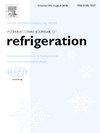Thermal management design and key technology validation for PandaX underground experiment
IF 3.8
2区 工程技术
Q1 ENGINEERING, MECHANICAL
International Journal of Refrigeration-revue Internationale Du Froid
Pub Date : 2025-04-30
DOI:10.1016/j.ijrefrig.2025.04.002
引用次数: 0
Abstract
The scale of liquid xenon experiments aimed at searching for rare events is expanding, with plans to reach up to fifty tons. These detectors and the accompanying distillation towers require a reliable cooling source that can deliver large cooling power in the liquid xenon temperature range. Previously utilized pulse tube refrigerators and GM refrigerators have the disadvantages including small cooling power, large space occupation, and non-standby mutuality, which become significant challenges to scaling up experiments. In this study, an auto-cascade refrigerator was developed using ethanol as a coolant, with improved heat transfer effect achieved by adopting a concentric shaft heat exchanger and an after-pumping heat transfer scheme. This system provides a stable cooling power of 2.5 kW at 155 K. Further, the feasibility and key technology of the centralized cooling system of 5 kW at 160 K is discussed. This study promises to simplify liquid xenon experimental auxiliary devices, thereby benefiting the PandaX-xT experiment scheme.
PandaX地下试验热管理设计及关键技术验证
旨在寻找罕见事件的液态氙实验规模正在扩大,计划达到50吨。这些探测器和伴随的蒸馏塔需要一个可靠的冷却源,可以在液态氙温度范围内提供大的冷却功率。现有的脉冲管制冷机和GM制冷机存在制冷功率小、占用空间大、非待机互换性等缺点,成为实验规模扩大的重大挑战。本研究以乙醇为冷却剂研制了一种自串级制冷机,采用同心轴式换热器和后泵式传热方案,提高了制冷机的换热效果。该系统在155 K时提供2.5 kW的稳定冷却功率。进一步探讨了160k 5kw集中冷却系统的可行性及关键技术。本研究有望简化液态氙实验辅助装置,从而有利于PandaX-xT实验方案。
本文章由计算机程序翻译,如有差异,请以英文原文为准。
求助全文
约1分钟内获得全文
求助全文
来源期刊
CiteScore
7.30
自引率
12.80%
发文量
363
审稿时长
3.7 months
期刊介绍:
The International Journal of Refrigeration is published for the International Institute of Refrigeration (IIR) by Elsevier. It is essential reading for all those wishing to keep abreast of research and industrial news in refrigeration, air conditioning and associated fields. This is particularly important in these times of rapid introduction of alternative refrigerants and the emergence of new technology. The journal has published special issues on alternative refrigerants and novel topics in the field of boiling, condensation, heat pumps, food refrigeration, carbon dioxide, ammonia, hydrocarbons, magnetic refrigeration at room temperature, sorptive cooling, phase change materials and slurries, ejector technology, compressors, and solar cooling.
As well as original research papers the International Journal of Refrigeration also includes review articles, papers presented at IIR conferences, short reports and letters describing preliminary results and experimental details, and letters to the Editor on recent areas of discussion and controversy. Other features include forthcoming events, conference reports and book reviews.
Papers are published in either English or French with the IIR news section in both languages.

 求助内容:
求助内容: 应助结果提醒方式:
应助结果提醒方式:


